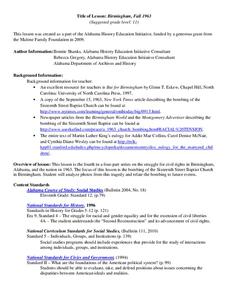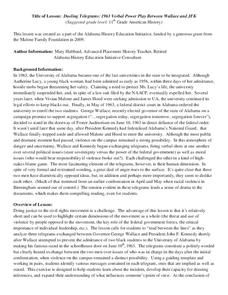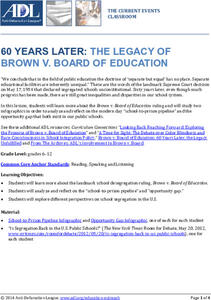Carolina K-12
Plessy v. Ferguson & the Roots of Segregation
How far in the past do the roots of Jim Crow and segregation extend? Young historians closely consider this question using detailed PowerPoint slides as a basis for discussion rather than lecture, culminating in an activity where class...
C3 Teachers
Murder of Emmett Till: Is It Ever Too Late for Justice?
The murder of Emmett Till is the focus of a guided inquiry that asks scholars to research the events, the trial, recent attempts to reopen the case and the effect of the murder on people today.
PBS
Martin Luther King Jr.: Civil Rights Leader
Expand class members' appreciation of the work of Dr. Martin Luther King, Jr. A powerful resource examines King's speeches, writings, and actions that reveal his deep commitment to a nonviolent approach to Civil Rights. Learners watch a...
PBS
Muhammad Ali: Boxer and Civil Rights Activist
Many young people today know Muhammad Ali as the aging boxer who lit the torch at the 1996 Olympics. Introduce young historians to Ali the boxer, the Civil Rights activist, the war protestor, and the humanitarian with a powerful lesson...
Center for Civic Education
The Power of Nonviolence: Rosa Parks: A Quest for Equal Protection Under the Law
Teach young historians about the historical legacy of Rosa Parks with a multi-faceted lesson plan. Pupils follow stations and use journals to explore prominent events, analyze primary resource documents, and engage in interesting...
Facing History and Ourselves
Civil Rights Historical Investigations
The murder of Emmett Till, the Selma to Montgomery march, and the desegregation of Boston schools are the focus of three units that ask class members to investigate why these events were so key in the struggle for civil rights....
Facing History and Ourselves
BPS Civil Rights
Include moments of heroism in a social studies module that includes three units. Focusing on the murder of Emmett Till, the movement of nonviolent resistance, and segregating schools in Boston, the units explore key events of the...
Tolerance
A Time for Justice
The Academy Award-winning documentary A Time for Justice launches a unit that examines America's civil rights movement. Class members examine key events and participants in the movement and consider how the civil rights movement...
Alabama Department of Archives and History
Birmingham, Fall 1963
Can any good come from acts of evil? The 1963 bombing of the Sixteenth Street Baptist Church in Birmingham, Alabama, and the eventual outcomes of the tragedy, are the focus of a lesson that asks groups to examine primary source documents...
Alabama Department of Archives and History
Dueling Telegrams: 1963 Verbal Power Play Between Wallace and JFK
Information, inferences, and innuendos. Text and subtext. Class members examine telegrams exchanged between President John F. Kennedy and Alabama Governor George Wallace, studying both what is stated and what is implied by the...
Curated OER
How Rosa Parks Sparked Change
Rosa Parks proves that one person, no matter their race, can make a difference.
Alabama Learning Exchange
African American Civil Rights Movement
An excellent resource defines the African-American Civil Rights Movement from the early 1900s through the legacy left in modern times. Every major date, event, and key player is described under clear overarching categories. The NAACP,...
Curated OER
How Often Do You Interact with People of Another Race or Ethnicity?
Is interacting with people from different backgrounds part of a well-rounded education? A big question awaits young readers as they explore two New York Times articles that discuss modern-day segregation, population statistics, and...
Curated OER
Justice Is Blind, Colorblind That Is
It's so interesting to see kids respond to articles about education. To start the day, prompt learners to discuss the words colorblindness and diversity. Then, split your class in two and have one side read an article from 2007 and...
Curated OER
The Movement Before the Movement: Civil Rights Activism in the 1940s
Many educators focus on the civil rights movement as it occurred after Rosa Parks incited the bus boycott. Extend the understanding of the fight for civil rights in the United States with this post-WWII lesson. Learners examine and...
Curated OER
Development of Federal Civil Rights Acts : 1950's - Present
Young scholars use the Internet to research one of five cases associated with Brown v. Board of Education and then join a group with people who researched the other four.
Curated OER
Jazz Music and the Crisis Over School Desegregation
High schoolers will learn to appreciate the civil rights movement with a focus on Little Rock, Arkansas. They will also acknowledge Louis Armstrong's unparalleled contributions to American music.
US House of Representatives
Hispanic-American Members of Congress in the Civil Rights Era, 1945–1977
Debates around immigration in the news are not new, but they are a defining feature of the Hispanic American experience throughout the twentieth century. Looking through the lens of Hispanic Americans in Congress, class members explore...
US House of Representatives
A Picture is Worth a Thousand Words
Groups select a photograph from one of the four eras of African Americans in Congress and develop a five-minute presentation that provides background information about the image as well as its historical significance. The class compares...
US House of Representatives
Keeping the Faith: African Americans Return to Congress, 1929–1970
The third lesson in a unit that traces the history of African Americans serving in the US Congress examines the period from 1929 through 1970. After reading a contextual essay that details the few African Americans elected to Congress...
US House of Representatives
“‘The Negroes’ Temporary Farewell,” Jim Crow and the Exclusion of African Americans from Congress, 1887–1929
Despite some advances made during the Reconstruction Era following the Civil War, the period from 1887 through 1929, African Americans serving in Congress suffered severe setbacks due to Jim Crow Laws and voter suppression. Class members...
Anti-Defamation League
60 Years Later: The Legacy of Brown v. Board of Education
Although the 1954 U.S. Supreme Court decision Brown v. Board of Education declared segregated schools unconstitutional, huge inequalities still exist in U.S. public schools. Learners analyze and discuss data presented in two...
Anti-Defamation League
What are Reparations and Should We Enact Them?
Young social scientists investigate recent legislative proposals for reparations for African Americans. They examine the rationale behind the proposals by viewing videos and reading related articles. To close the instructional activity,...
Anti-Defamation League
Pink Collar Jobs: Gender Segregation and Pay Inequality in the Workplace
Cartoons showing women in the workplace spark a discussion about being a business executive and claiming the corporate ladder. Small groups analyze data and create graphs that display essential information from the handouts. The class...

























